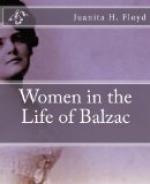In her convictions, Madame de Balzac was a curious mixture of atheism and profound faith in a Divinity before whom mankind was accountable for all its good or bad deeds. All through her long life she had been under the influence of her father, one of the remarkable men of his generation, who had enjoyed the friendship of most of the great French writers of the period immediately preceding the Revolution, including Voltaire; he had brought her up in an atmosphere of the eighteenth century with its touch of skepticism, and the Encyclopedia had always remained for her a kind of gospel, in spite of the fact that she had been reared in one of the most haughty, aristocratic circles in Europe, in a country where the very mention of the words liberty and freedom of opinion was tabooed, and that her mother had been one of those devout Roman Catholics who think it necessary to consult their confessor, even in regard to the most trivial details of their daily existence. Placed as she had been between her parents’ incredulity and bigotry, my aunt had formed opinions of her own, of which a profound tolerance and a deep respect for the beliefs and convictions of others was the principal feature. She never condemned even when she did not approve, and she hated hypocrisy, no matter in what shape or aspect it presented itself before her eyes. This explains the courage she displayed when against the advice and the wishes of her family, she persisted in marrying Balzac, though it hardly helps us to understand from what we know of the latter’s character, how he came to fall so deeply in love with a woman who in almost everything thought so differently from what he thought, especially in regard to those two subjects which absorbed and engrossed him until the last days of his life, religion and politics.
That he loved her, and that she loved him, in spite of these differences in their points of view, is to their mutual honor, but it adds to the mystery and to the enigmatical side of a romance that has hardly been equalled in modern times; and it accounts for the fact that some friction occurred between them later on, when my aunt found herself trying to restrain certain exuberances on the part of her husband regarding her own high lineage, about which she never thought much herself, though she had always tried to live up to the duties which it imposed upon her. I am mentioning this circumstance to explain certain exaggerations which we constantly find in Balzac’s letters in regard to his marriage. His imagination was extremely vivid, and its fertility sometimes carried him far away into regions where it was nearly impossible to follow him, and where he really came to believe quite sincerely in things which had never existed. For instance in his correspondence with his mother and friends, he is always speaking of the necessity for Madame Hanska to obtain the permission of the Czar to marry him. This is absolutely untrue. My aunt did not require in the very least the consent




